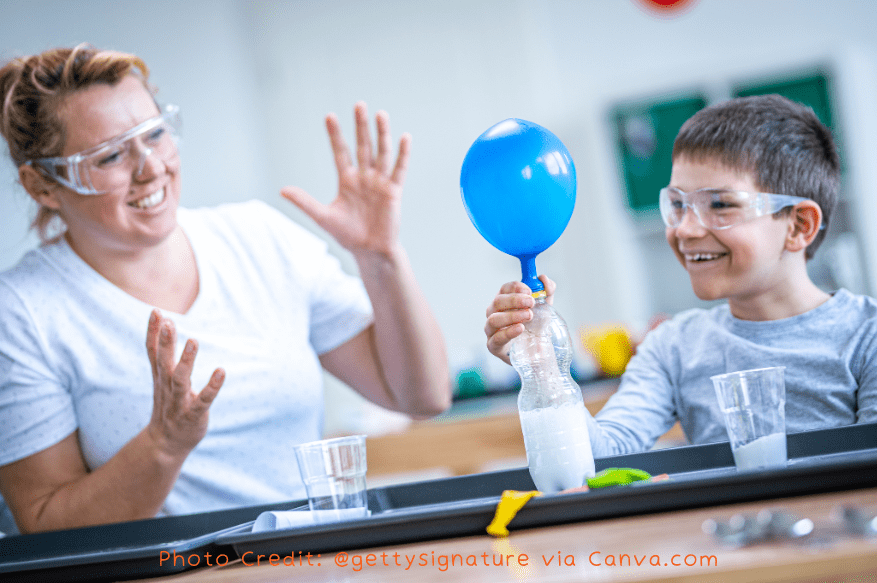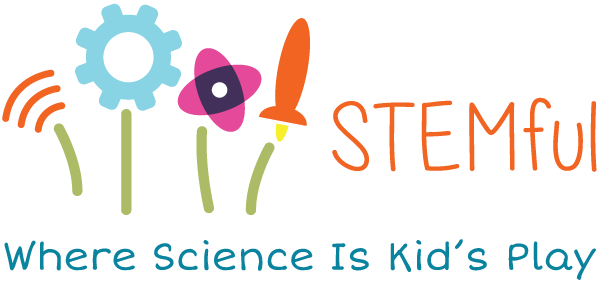Introducing STEM concepts to children at an early age helps lay the foundation for their academic success in challenging subjects later in life. But beyond cognition, STEM activities help kids develop soft skills—such as emotional intelligence, resilience, and problem solving—that will enable them to succeed outside the classroom. As children make hypotheses, conduct experiments, and bounce back from failure, they can learn how to regulate their emotions, self-soothe, persevere, and better communicate with others, all critical skills to master as they mature. The scientific method’s iterative approach means that “failure,” which, in science, is simply an outcome that diverges from the expected result, presents an opportunity to learn from it, make a new hypothesis, troubleshoot, and try again.
Complex tasks may be overwhelming for kids, especially younger children, but they can learn to tackle big challenges with a step-by-step approach, an integral part of many STEM activities. Learning to self-soothe with calm and focus when emotions get the best of them can also help kids manage feelings when challenges pop up. And using the scientific method can help them understand that “failure” is an inherent part of the discovery process. Finally, patience can be taught by engaging with projects that require a child to walk away while something grows or cures before it’s ready for the next step.

How Does STEM Teach Self-Regulation?
A crucial aspect of developing emotional intelligence is the ability to self-regulate. Temper tantrums or instances of acting out are very common in young children, especially before the age of five, but later, it may be a sign of anxiety or other conditions, or simply a learned behavior. Fortunately, self-regulation can often be taught, and many children benefit from being able to take control of their behavior and learn to change it with support—rather than “rescuing” when the going gets tough—from parents and caregivers.1 Instead of rushing to alleviate a child’s frustration with a difficult task, adults can provide the “scaffolding” necessary to support kids while they tackle it on their own. By asking questions, positively reinforcing little successes along the way, helping to break up bigger tasks into smaller steps, and encouraging kids to accomplish things independently (even with an adult standing by), parents and caregivers can foster feelings of confidence and mastery that kids will carry with them.
STEM Activities to Develop Emotional Intelligence
Whether you’re looking to help kids learn to focus, improve their ability to self-regulate behavior, or stick with a goal despite challenges, we have activity suggestions for you to try at home.
Focus and Self-Soothing
When feelings overwhelm, self-soothing strategies may help children cope. Sensory play with a DIY sensory bin gives kids an opportunity to step away from a frustrating experience and distract themselves with touch, play, and a moment of focus to help them reset.
Patience
Learning to develop patience and delay gratification is challenging for many of us—there’s a reason the marshmallow test is so well known, and so relatable for humans of all ages. And while current research casts doubt on the experiment’s ability to predict future success, studies show that adolescents and adults who demonstrate patience have better lifetime outcomes overall.2 Today’s attention economy presents unique challenges. To help foster patience in kids, try a STEM experiment that requires a little more time investment. Try growing plants from kitchen scraps, and when you’re done, compost them at home!

Perseverance
Along with patience and focus, the ability to persevere and to learn from failure can help kids develop resilience that will help them move through challenges in life. The scientific method—formulating a hypothesis, conducting the experiment, and observing the results and using them to create a new hypothesis—uniquely prepares kids for this sort of challenge, in a safe way that encourages investigation and critical thinking. Any experiment can begin with a hypothesis! Or help kids explore mass and gravity building a gummy candy structure. Begin by asking kids what characteristics they think will make the tallest structure. How about the strongest? When it falls apart, ask kids what they would do differently, and begin the project again with that new information.
STEM- and STEAM-based learning helps young children develop competencies that they can build on as they grow, and it’s never too early—or too late. Engaging with science helps foster the soft skills that kids need to succeed not only academically but also socially and emotionally. For more collaborative learning experiences, sign them up for one of STEMful’s programs, and sprout their curiosity.
- Matthew H. Rouse and Alnardo Martinez, “How Can We Help Kids with Self-Regulation?,” Child Mind Institute, accessed July 7, 2025, https://childmind.org/article/can-help-kids-self-regulation/.
- Dee Gill, “New Study Disavows Marshmallow Test’s Predictive Powers,” UCLA Anderson Review, February 24, 2021, https://anderson-review.ucla.edu/new-study-disavows-marshmallow-tests-predictive-powers/; and Bart Golsteyn, Hans Grönqvist, and Lena Lindahl, “Why We Should Teach Our Children Patience,” World Economic Forum, August 21, 2014, https://www.weforum.org/stories/2014/08/patience-children-research-lifetime-outcomes/.
